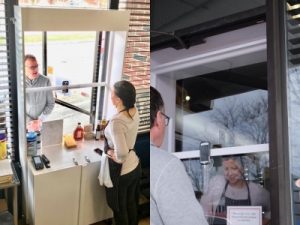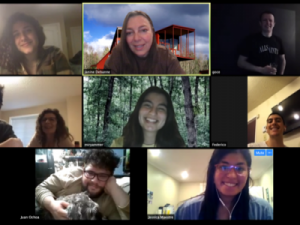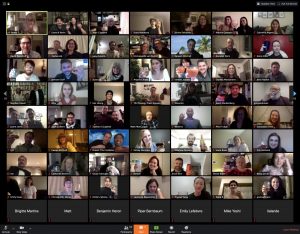Critical Intersections 2020-2021

This year, the Azrieli School of Architecture & Urbanism (ASAU) will be organizing, hosting, and supporting a number of initiatives and events, given the unfolding global reckonings with systemic racism and inequity, climate change, public health, and the calls for schools of architecture to more fully engage with the urgency of these questions and issues. Below you’ll see an initial list of programming at the school – including efforts by student groups on well-being and mental health and public fora centered on diversity and inclusion. You will also see how we will be academically engaged – from individual coursework and curricula to shared symposia and colloquia across our graduate and undergraduate programs. To help us expand this into plural discourse, we are delighted that we can engage with diverse voices across and beyond our school to help centre, catalyze, and commit to important conversations and transformative change at the school. Please do check back here, and at our various social media sites (Instagram: @carleton_architecture; Twitter: @CarletonU_Arch, and on our Facebook page) for any updates and changes.
________________________________________________________________
PROGRAMMING
September 2020
Stress-reduction workshop
All students are invited to attend this event on Wednesday, September 23, at noon. Megan Gilbertson, the health promotion coordinator in the Office of Student Affairs, will share information about places, supports, and strategies for well-being. Bring your questions and ideas. Here’s the Zoom link: https://zoom.us/j/95438364097
October 2020
Diversity Working Group Workshops and Lectures
The student-led Diversity Working Group is in the process of confirming workshops and lectures during the school year. Please look to their Instagram account (@dwg.asau) for information and updates on programming throughout the year.
November 2020
Visiting Critics-in-Practice Colloquium
Visiting Critics-in-Practice Nicole Nomsa Moyo, Patrick Stewart, and Mario Gooden will respond to students’ questions about the expanding role of architectural practice in addressing systemic inequities in the built environment.
December 2020
INTERSECTIONS/BECOMING: Urbanism and Conservation Colloquium
A day-long colloquium and final review for Conservation Studio 1 and Urbanism Studio 2. The respondents are Azrieli Visiting critics (Mokena Makeka, Cape Town), Mario Gooden (New York) plus other guests.
In most countries around the world, the present reality is still characterized by a system that both creates as well as reproduces inequalities. In order to address these debates and be relevant for the present, it is imperative that architecture learns from and contributes to other fields such as sociology, political theory, anthropology, gender, and race studies. We will borrow modes of thinking from these fields that can inform architectural theory and practice. This critical framework will set the foundations for bringing together the 3rd-year students in our undergraduate urbanism and conservation majors, to discuss their work with guests, across overlapping themes.
January 2021 Public Lecture
Canada’s 12 schools of architecture are each sponsoring one lecture during the 2020 – 2021 academic year on the theme of Diversity. Each school will host a speaker(s)– in a collaborative, cross-Canada lecture series to begin on the West coast at the University of British Columbia – with Carleton University’s lecture in January – and ending at Dalhousie University in the spring. Check here for information about the fall line-up: https://study-architecture.ca/pancanada2021/ and stay tuned for updates on the lecture schedule and speaker information.
February 2021
Open Workshop on structural forms of oppression
Our school will invite a group of Carleton faculty from across several disciplines to deliver short introductory workshops to faculty and students on social constructs such as race and gender, among others. The aim of these workshops is to create an informed framework for discussing complex contemporary issues in which architecture and educators take part. These workshops will bring awareness of important concepts, vocabulary, institutions, and behaviours that perpetuate oppression and will help open a discussion about what our profession can do. These workshops will be open to everyone.
March 2020
M.ARCH OPTIONS STUDIO COLLOQUIUM: ARCHITECTURE & ACTION
The Master of Architecture Options Studios are addressing four themes this year, under a general umbrella of the architectural imagination as an emancipatory tool. This colloquium will bring together Options Studio faculty, students, and invited guests for discussion and conversation around the themes of the studio as they are connected to the urgency of the present. This colloquium will also feature a virtual gallery of studio work produced in the first half of the term. Participants will include our graduate studio faculty, visiting studio critics for the winter term, 2020-21 Azrieli Visiting Critic Mokena Makeka (Cape Town), Neil Spiller (London), and others.
________________________________________________________________
DWG: Diversity Working Group
The DWG (Diversity Working Group) is a student-led working group made up of BIPOC (Black, Indigenous, and People of Colour) students, allies, and faculty supporters from the Azrieli School of Architecture & Urbanism (ASAU). The working group was formed to hold the faculty and school accountable to move toward a more equitable learning environment.
The DWG’s purpose is to advocate for changes in policy and curriculum to eradicate the inherent racist and anti-progressive history in the design industry. By encouraging actionable change and promoting equity in our design education we can create safe spaces for all. We’re striving to create an environment that educates our student body to a higher standard of understanding, empathy, and activism on BIPOC issues. We hope that our educational environment can transform to provide students and faculty with the necessary tools to hold architectural institutions and practice to a higher standard.
Advocacy, Education, and Community Support are the fundamental components of the working group that drive the DWG’s actions and outreach.
Email: dwg.asau@gmail.com
Instagram: @dwg.asau Website: dwg-asau.ca
TAL: The Architecture Lobby
The Architecture Lobby Ottawa is a student-driven collective advocating for sustainability, justice, equity, and inclusivity in architectural pedagogy. TAL-Ottawa hopes that the discussion of these ideas leads to organizing action, planning events, and opening the possibility for other collaborative projects.
The Architecture Lobby was founded by Peggy Deamer at Yale University. It defines itself as: “A member-driven activist organization devoted to raising the political consciousness of the design fields and organizing a more just profession.”
The Lobby’s manifesto ranges from advocating for fair pay in practice, labour rights, and unionization. Its work is highly focused on the intersection of politics, economics, and architecture. Each chapter creates initiatives and mandates that reflect the local needs of their community.
Email: archlobbyottawa@gmail.com
Instagram: @arch_lobby_ottawa
P2P: Peer to Peer
ASAU Peer-to-Peer is a student-led group established to build a stronger educational community among students by sharing experiences, knowledge, and skills. Peer-to-Peer provides one-on-one support with peers supporting peers – connecting with students on their own schedule, and as needs arise. Students can reach out via email for support about course work, time management, technology, writing or design skills, etc., and will be assigned a peer to help talk through your work.
As part of the program, students connect with a student mentor, who can provide practical guidance and understanding, help navigate university systems, promote learning, and generally help students with work, best practices, and the studio environment. This program is not just meant for first-year students – it is open to all years as we understand that there will always be new ways to learn and practice, and that there are new challenges to be met throughout the degrees.
Students should email Peer-to-Peer (asau.peers@ gmail.com) with their request/name/year, and a mentor will be in touch to set up a one-on-one session.
Email: asau.peers@gmail.com
____________________________________________________________________
COURSES & CURRICULUM: Broadening the Conversation
Within institutions across Canada, students have been demanding an assessment of the foundational structure of architectural pedagogy, integration of critical race theory into our curriculum, and a more fulsome demonstration of commitment to material and resource conservation. This year, the September Director’s Project addresses these issues and members of the faculty are testing some curricular innovation through the following courses: the first-year Introduction to Architecture course; the fall undergraduate studios in conservation and urbanism; a winter elective seminar on Architecture and Violence; the Master of Architecture Professional Practice course, and the Master of Architecture winter Option Studios.
ARCH 1000: INTRODUCTION TO ARCHITECTURE: Undergraduate 1st Year Lecture Class
What is architecture, anyway? We first think of buildings, of periods and styles, of relationships with clients, of codes for safety, of the requirement for licensure. This course will address architecture’s wide reach, engaging with how the discipline’s long history is at once a foundation for how we think about architecture, and a provocation to think about it more broadly. In contrast to courses in architectural history, the approach here is non-linear, intersectional, and interrogative. In this course, architecture becomes a lens for viewing the world. And in turn, global challenges of climate change, economic inequity, conflicts over ideas of property and individualism, hierarchies perpetuated through systemic inequity are provoking us to think about architecture in new and expanding ways.
Organized by Associate Professor Ozayr Saloojee and Visiting Azrieli Critic Mokena Makeka, the course structure includes guest lectures by several members of the Architecture & Urbanism faculty, PhD students, and practitioners. Each week introduces a new theme, which sets the stage for understanding architecture’s multiple dimensions, interdisciplinary possibilities, and potential agencies.
THE DIRECTOR’S PROJECT 2020: “The Fierce Urgency of Now”
We are now faced with the fact that tomorrow is today. We are confronted with the fierce urgency of Now. In this unfolding conundrum of life and history, there “is” such a thing as being too late. This is no time for apathy or complacency. This is a time for vigorous and positive action.”― Martin Luther King Jr., March on Washington, 1963
This year’s Director’s Project calls upon students to use the unique language of drawing to respond to the urgency of our own now. These are fraught and troubling times, and drawing is a means of agency through which to interrogate the spatial dimensions of our intersecting crises of racism, climate change, a global pandemic, and economic inequity. And as a language, the drawings will become a collective conversation, an embodiment of the current spirit of our school.
The Director’s Project will set the stage for further discussions in many of the design, urbanism, and conservation studios this year, which are addressing the sociopolitical dimension of architecture and urbanism.
INTERSECTIONALITY: Undergraduate 3rd Year Conservation Studio 1
The politics of domination refers to the ideological ground that they (race, gender class, etc.) share, which is a belief in domination, and a belief in the notions of superior and inferior, which are components of all of those systems. For me it’s like a house, they share the foundation, but the foundation is the ideological beliefs around which notions of domination are constructed. – bell hooks
This studio, led by Professor Natalia Escobar Castrillón, applies an intersectional framework of analysis to architecture. It reflects on the role of conservation architects in addressing contemporary debates on architecture in relation to race and its intersections with gender and social class among others. For this purpose, the object of study will be the reminiscent architectures and landscapes of slavery of selected plantations in the United States. Many of these enduring sites have been preserved as mere aesthetic objects usually transformed into opulent leisure facilities. This process has obliterated and silenced the history of human suffering with which they are deeply associated, as well as expressions of resistance that the enslaved population undertook in these places. We will reflect on ways in which architectural conservation can reframe these sites critically and on how we can reveal the multiple histories that overlap on these loaded sites. From this perspective, conservation means questioning, revisioning, and subverting dominant versions of the past rather than its passive and complicit perpetuation.
THE CITIES WE BECOME AND DENY: Undergraduate 3rd Year Urbanism Studio 2
No one burns down the center overnight. – N.K. Jemisin
Riffing on the title of N.K. Jemisin’s new book “The City We Became,” the fall urbanism studio for third-year students, taught by Professor Ozayr Saloojee and PhD student Jorge Rivera Gutierrez, will explore cities as sites of dismantling and of potential becoming — bringing to the core what has been marginal (at best) and abandoned (at worst). The studio is rooted in questions of spatial equity, marginality, justice, privilege, accessibility, and of the imagination as an emancipatory and liberational tool for the urban project. The studio begins by studying global metropoles: how their systems and apparatuses and tools (not just their “aesthetics”) allow us to see and to re-map the city we thought we knew. Informing this work are a series of novels as city guidebooks for the Apparatus Atlas – texts by Zadie Smith, Etel Adnan, Pitchaya Sudbanthan, Jesmyn Ward and Sukehtu Mehta, among others. The second project starts at the personal scale of our isolationist (pre and present) urban (and now-COVID) landscapes of quarantine, moving outward to the city beyond, where students will, for their final project, analyze, interpret and imagine a new, collective urban future for the city they live in – a city in-the-becoming.
HOUSING STUDIO – Undergraduate 4th Year Design Studio Lecture Series
Studio 6: Housing, City Building and Placemaking will be running a parallel Friday afternoon lecture, podcast and film screening series curated to raise awareness and foster discussion of urgent cultural issues related to housing as a counterpoint to the white, privileged male culture that dominates the field of corporate real estate development. Content is selected to showcase underrepresented and marginalized voices influencing city design. The Friday series focuses on multiplicity and plurality, while addressing housing as a right, responsibility, and its history as a tool in the politics and social development of place in our urban environments.
Examples of content include a podcast featuring Wandile Mthiyane of Ubuntu Design, and films such as Urbanized by Gary Hustwit, City Dreamers by Joseph Hillel, and the Pruitt-Igoe Myth by Chad Friedrichs. Faculty, students and invited guests will participate in round-table discussions and panels about the topic of housing and the power and role of urban planning. Lectures related to the physical and social consequences of housing in Canadian contexts will be presented as a part of the weekly conversations.
ARCHITECTURE AND VIOLENCE – Undergraduate 4th year Winter Term Seminar
PhD Student and Contract instructor Jenan Ghazal will teach a graduate level seminar, open to fourth-year undergraduate students, on the subject of her PhD dissertation “Architecture and Violence”. This history/theory seminar will examine case studies where architectural planning and design exercise aggression against the human body. Together, we will treat a range of concepts developed by architects, philosophers, and historians to consider the notion of architectural/spatial/slow violence as central to a critical understanding of the built environment. Rather than an inward-looking investigation of the profession’s limitations, the seminar will gaze in the opposite direction—to the built horizon that traditionally lay beyond our profession’s radar: conflict zones.
PROFESSIONAL PRACTICE
Visiting Critics-in-Practice Nicole Nomsa Moyo, Mario Gooden, Patrick Stewart
This course is both an introduction to the practice of architecture according to existing professional and regulatory frameworks in Ontario and Canada, and an interrogation of how current models of practice and regulation may compromise our goals of social and environmental justice. Select practice-based experiences, guest lectures, and case studies of local and international projects will allow students to engage in critical conversations related to the architect’s role in design activism, advocacy, equity, community engagement, sustainability and practice in a time of pandemic.
The team of practitioners teaching the course, and visiting as guest speakers, represent a range of practice types, many of which engage in non-traditional urban activism, community based processes, collaborative and experimental practices, and aspects of practice-as-research. A collaborative teaching approach, with many opportunities for conversation and questions during class time, will engage students, in real time, in the debates and challenges facing the profession today.
Master of Architecture OPTION STUDIOS
This suite of elective winter studios will be a central part of the school’s engagement with ‘the fierce urgency of now.’ Four studio themes are each divided into six-week segments, each taught by visiting critics or a member of the faculty. Additional participants will engage with the studios at mid-and final reviews and will participate in a colloquium in March 2021.
Individual studio themes for our Options Studio pairings this year include “Strange Weathers,” which will focus on questions of climate and entropy; “Divided Cities/Unsettled Grounds,” which will look at contested urban sites around the world; and “Fictions/Mobilities,” explores ideas of architectural narrative and diaspora. “Collective Bodies” will be led by faculty collaboratives from Dark Matter University – a recently formed multidisciplinary collaborative that was founded in 2020 “to work inside and outside of existing systems to challenge, inform and reshape our present world toward a better future.”
We are in the process of finalizing our Options Studios for the coming winter term, but confirmed teaching faculty include Professor Ozayr Saloojee, Neil Spiller (London) and Elise Hunchuck (Berlin), as well as faculty teams from Dark Matter University. Stay tuned for more information about the studios and related colloquium.


